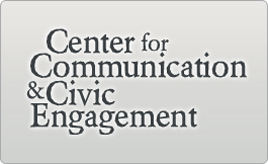NEWS AND EVENTS
What we have been up to
“What’s the Economy for, Anyway?”
Bring Your Own Bag Campaign (October 2008)
"Paper or plastic?” has long been an either/or question, but for many concerned citizens the correct answer is neither/nor. In recent years, cities and countries around the world have adopted a flurry of laws and regulations to curb the consumption of paper and plastic bags and encourage the use of more eco-friendly alternatives such as cloth. The Don’t Bag Seattle/Bring Your Own Bag Campaign is an attempt to spread awareness about this important issue at the local (Seattle) level. The campaign grew out of a spring 2008 course taught by Lance Bennett called “Media, Society, and Political Identity.” Under the supervision of Tim Jones, the coordinator of the “What’s the Economy for, Anyway?” Project, during the summer of 2008, four students from that course (Robert Donahue, Eliot Hemingway, Danielle Krieger and Casey Warren) created an educational website with significant online traffic. Click here to watch a series of cool videos about plastic bag consumption that were made for the project.
“What’s the Economy for, Anyway?” National Vacation Poll (July 2008)
The “What’s the Economy for, Anyway?” project would like to highlight a national poll recently conducted by the Opinion Research Corporation in coordination with the “Take Back Your Time” campaign. This poll is the first of its kind to solicit Americans for their opinions regarding a national paid vacation law. The results show strong support (69%) for such a law, with 59% of respondents supporting a national policy that guarantees two weeks or more of paid vacation for every working American. We encourage you to take a look at the press release and the results of the poll yourself.
“What’s the Economy for, Anyway?” YouTube Video Competition (June 2008)
In the spring of 2008, the “What’s the Economy for, Anyway?” project sponsored a video competition which challenged University of Washington students in Professor Lance Bennett’s “Media, Society, and Political Identity” (POLS/COM 306) class to create and promote short political videos relating to many of the issues addressed by the “What’s the Economy for, Anyway?” educational resource project. The winning video, “The Market: Identity,” was an action-packed commentary on how intensely “branded” the world has become. Other notable videos include “Bring Your Own Mug,” which examined the problem of non-recyclable cups at Starbucks, and “A Doorknob is Forever,” which makes fun of advertisers who attempt to sell us products we don’t really need.
Regional “What’s the Economy for, Anyway?” Conference (April 2008)
The “What’s the Economy for, Anyway?” project followed up the 2007 national kick-off conference (see below) with a regional conference in Seattle, Washington on Saturday, April 12, 2008. The Seattle conference consisted of nine workshops on topics as wide-ranging as alternative economic models, sustainable business and fair trade, and the costs of consumerism. One of the highlights of the conference was Annie Leonard’s showing of the video “The Story of Stuff,” a 20-minute, fast-paced, fact-filled look at the underside of our production and consumption patterns. Click here to view the entire conference schedule, including the titles of all talks and the names of all speakers.
National “What’s the Economy for, Anyway?” Conference (October 2007)
The “What’s the Economy for, Anyway?” project kicked into gear at a national conference in Washington D.C., October 5-7, 2007, as part of the Washington D.C. Green Festival. Some 350 people attended three days of speeches and workshops by authors Bill McKibben, Frances Moore Lappe, Hunter Lovins, Juliet Schor, Gar Alperovitz and about 85 other prominent experts and activists. After the conference dozens of participants wrote to express their excitement about the conference content and their interest in continuing to be informed about the project. While it was not possible to videotape all the presentations, we are pleased to make available a representative sample of the presentations on this Web site. Click here to view video and listen to audio from the conference. To access the agenda and the list of speakers please visit the conference Web site.


